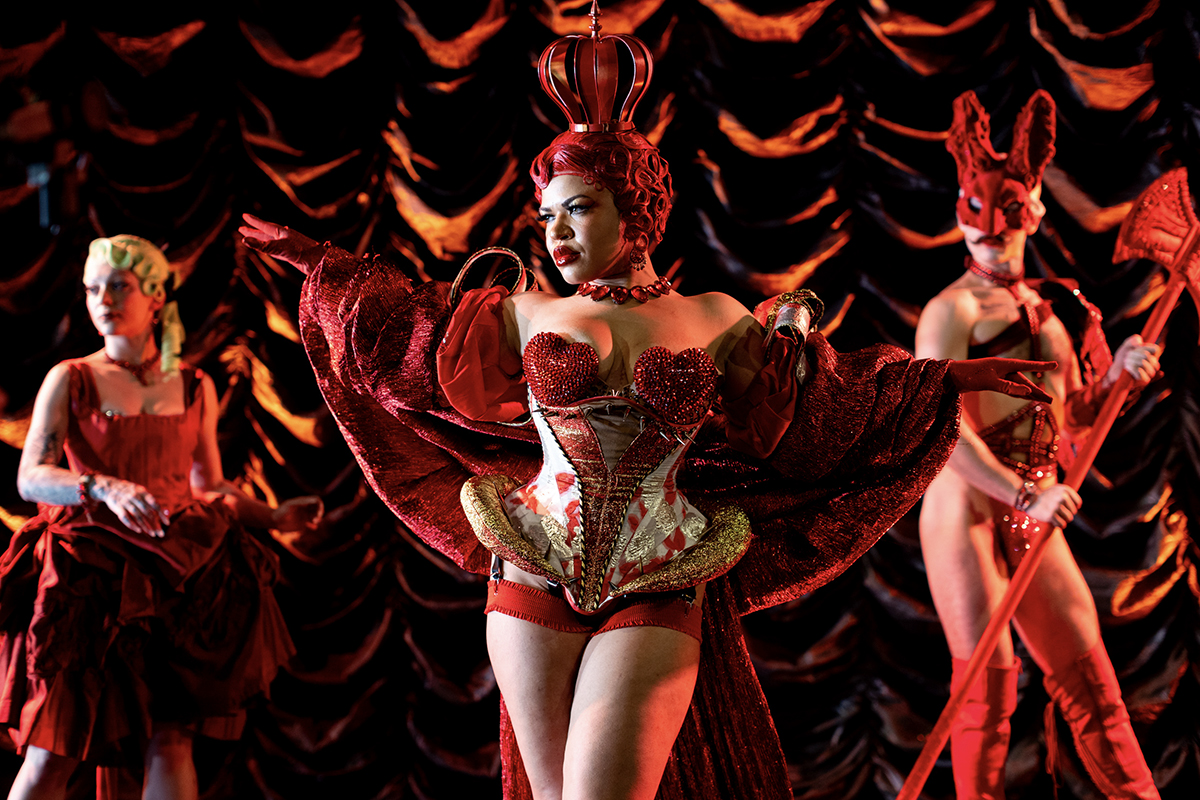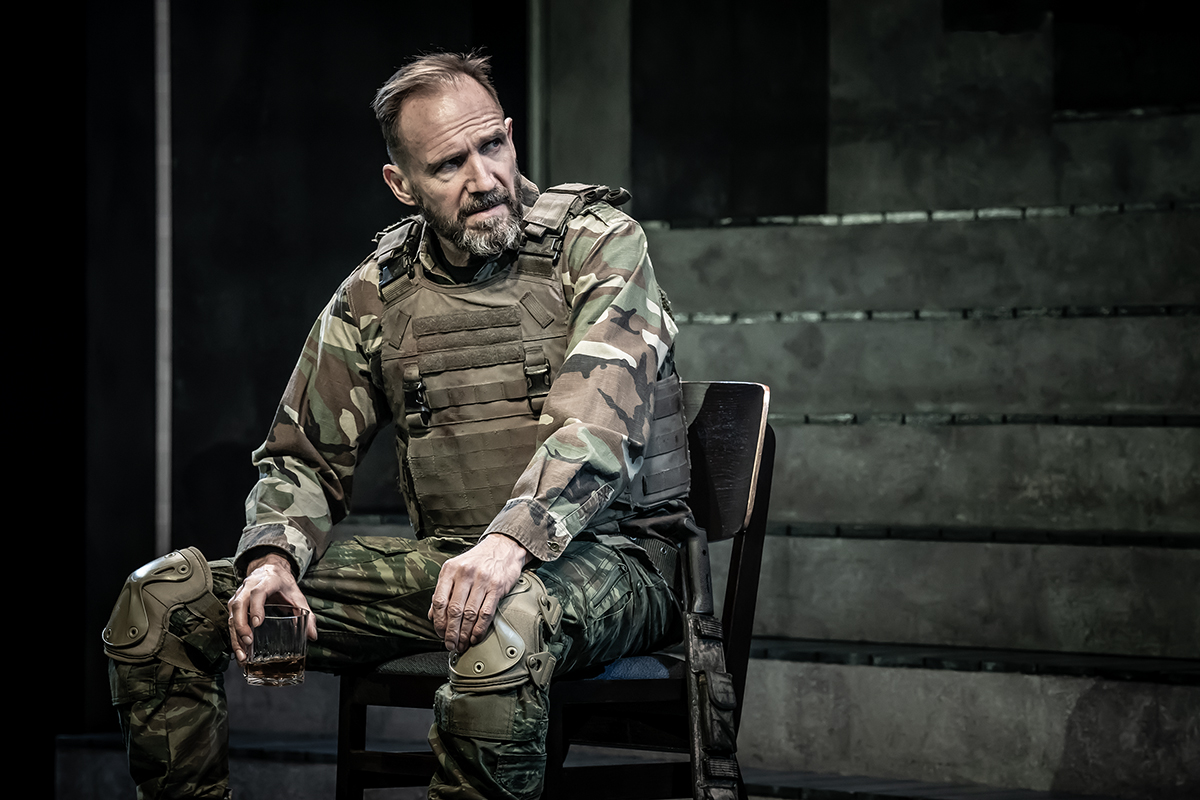Review: Rosencrantz and Guildenstern Are Dead
A medieval yet modern and thoroughly entertaining evening at The Folger

Intimate, funny and anachronistically atmospheric, the Folger’s Rosencrantz and Guildenstern are Dead (![]()
![]()
![]()
![]() ) is rather like Tom Stoppard by way of someone’s rather fabulous attic. And, despite being a rebellion against Stoppard’s call for a sparse set, it absolutely works.
) is rather like Tom Stoppard by way of someone’s rather fabulous attic. And, despite being a rebellion against Stoppard’s call for a sparse set, it absolutely works.
Magically cluttered and climbable, Paige Hathaway’s set is filled with an intriguing jumble of objects, art, books — even a suspended wooden moon. A flight of a dusty, dark imagination, it all blends seamlessly with the Folger Theatre’s medieval chapel vibe.
But it’s not just a feast for the eyes. Like the three-dimensional chess game of Stoppard’s play, it works on other levels. It might be an attic or the backroom of an auction house, but it might also be symbolic of the daily clutter of the mind. It is in this place, which holds as many inconsequentials as it does clues, that Rosencrantz and Guildenstern find themselves, like rogue thoughts.
It is a provocative and evocative place in which to begin Stoppard’s whirlwind of a contemplation. But is also a thoughtful way in which to up the accessibility of a piece that might otherwise present challenges for the uninitiated.
And for those unfamiliar, Stoppard has pulled Rosencrantz and Guildenstern, two minor characters from Hamlet, into center stage — where he pokes, prods and cajoles them into realizing that with existence, comes the certainty of nonexistence. And as they come to understand that their fates may be sealed as a matter of Shakespeare’s plot, they also become expressions of a very contemporary grappling with inevitabilities and how one must come to exist with them. Like two sides of the coins that serve as toys and tools throughout the play, Rosencrantz and Guildenstern are the embodiment of thoughts that flip between being questingly analytical and vaguely in denial.
It is from these perspectives that the two young men try to navigate the mystery of their predicament and what to do about it. It doesn’t help that Hamlet -– a drama in progress in another dimension — regularly, if unpredictably, breaks through into their space. Bridging both worlds is a troupe of wandering neo-medieval players whose antics and provocations serve Hamlet’s reality, as well as those of the two young men.
Thus, without doubt, the play resides within the traditions of the Theatre of the Absurd. And if you have found this tradition tolerable only under certain circumstances (i.e., only when there is absolutely no other conceivable thing to do, watch or stare at) do not yet click away. Even though these men are trapped, Waiting for Godot-style, in their world of angsting unknowns, Stoppard makes it so entertainingly witty, fun and ultimately affecting, you will hardly notice you have been being existential. It is a testament to Stoppard, but also to this particular production, with its enthralling set, lively ensemble and director Aaron Posner’s enormous joy in the mind-tickling language, irreverent silliness and an astute understanding of the pathos in these two young men.
For those who do know the play, like Shakespeare success with Stoppard is very much about delivery. Do the actors get his voice? Do they feel his progressions? Are they as ruefully perplexed as he is by the dawning the realization that all must end — and without any particular reason?
Here, the answer is yes to all of the above, give or take. At the get-go, Romell Witherspoon as Rosencrantz, and Ian Merrill Peakes, as The Player, stand out for their perfectly-pitched engagement, their savoring of and fun with the language and their keen sense of who their characters must be to forward this piece. As the unassuming Rosencrantz, Witherspoon offers a palpable sweetness and bewilderment, but always touched with a kind of wry humor. He is the rare actor who has the innate understanding of how understatement brings an audience close.
Portraying a very different kind of character, Peakes gets innately that The Player must carry his every scene, serving as linchpin to Stoppard’s existential summersault. Peakes is extraordinarily comfortable with the language, a natural comic and offers the sense of unpredictability that this play needs to keep it vitally alive and pushing. Serving as his acting troupe is a nice ensemble of multi-talented players, with special mention to the comic miming talents of Stephen Russell Murray as Tragedian.
More complicated is Adam Wesley Brown as Guildenstern. Appropriately agitated and high energy as the analytical counter-weight to the guileless Rosencrantz, Brown nevertheless could use a tad more of his colleague’s understatement and economy of movement. Brown has more than enough charisma; he needn’t guild the lily. He is also sharply good with the language, but again is not quite as lyrical as he could be. Though something of an apple to this orange, one can’t help but think of the verbal music of Cumberbatch’s Sherlock. Still, having said this, Brown is memorable, vital and a positive force.
Carrying the Hamlet plot is an energetic sub-ensemble, with Craig Wallace making for a thunderously memorable Claudius and Biko Eisen-Martin a strikingly interesting Hamlet. Andy Prosky adds some good old fashioned Shakespearian oomph to his Polonius.
Thus, this Rosencrantz is medieval yet modern, silly yet existential, and all around thoroughly entertaining.
Rosencrantz and Guildenstern are Dead runs to June 21. Folger Theatre, 201 East Capitol St. SE. Tickets are $30 to $75. Call 202-544-7077 or visit folger.edu.
Support Metro Weekly’s Journalism
These are challenging times for news organizations. And yet it’s crucial we stay active and provide vital resources and information to both our local readers and the world. So won’t you please take a moment and consider supporting Metro Weekly with a membership? For as little as $5 a month, you can help ensure Metro Weekly magazine and MetroWeekly.com remain free, viable resources as we provide the best, most diverse, culturally-resonant LGBTQ coverage in both the D.C. region and around the world. Memberships come with exclusive perks and discounts, your own personal digital delivery of each week’s magazine (and an archive), access to our Member's Lounge when it launches this fall, and exclusive members-only items like Metro Weekly Membership Mugs and Tote Bags! Check out all our membership levels here and please join us today!





















